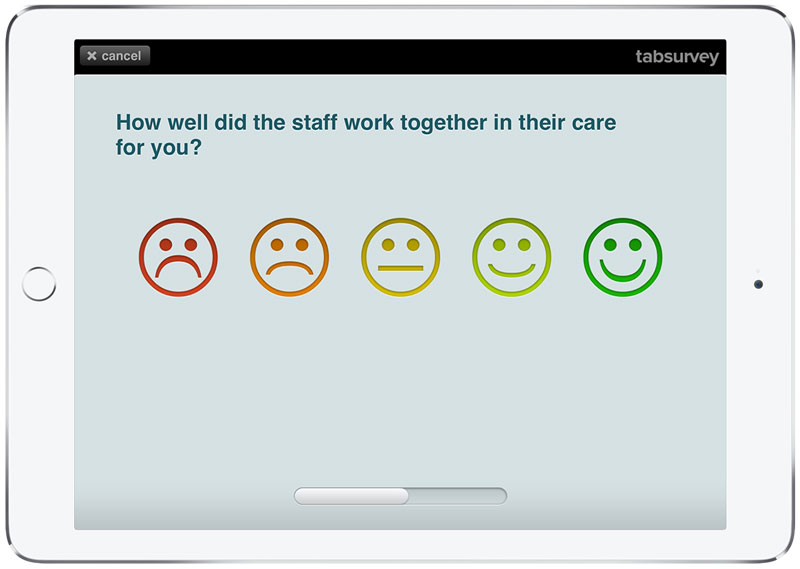Background
I remember when tabsurvey first started out as a Software as a Service (SaaS) company. For a few years we had been selling our service to customers that we approached directly. Either through cold canvassing or our network. But one day back in February 2012, we launched our service online for anyone to sign up for and try. It was quite existing for us, and I clearly remember our first signup. It was an Australian hospital, and their patient satisfaction survey was titled: Patient Centered Care. Since then other hospitals and medical institutions have started using our service for conducting patient satisfaction surveys of different kinds.
In this blog post I will deal with some issues related to patient satisfaction surveys. Firstly, the importance of conducting patient satisfaction surveys in the first place. Secondly, how a patient satisfaction survey differs from other satisfaction surveys in nature. Finally, I will address which key issues to focus on, what questions to ask, and lastly, how to ask them.
Why perform a patient satisfaction survey?
I have lived most of my life in Denmark, where we have a free and fairly well-functioning healthcare system. Therefore, you may ask yourself why it’s important to survey patients. You could argue that since there’s a public system in place, there really isn’t much of an alternative.
However, under different governments, the public healthcare system has been subject to large cost-saving initiatives. At the same time, we expect the same services for less money. Cutbacks, restructuring of work processes and new IT-systems are all part of the new reality for doctors, nurses and all other employees. As a consequence, and for various reasons, the public healthcare system needs to prove a point. It needs to prove to patients, politicians and society in general that it cares about the services it provides and patient satisfaction.

The private healthcare sector hasn’t not been subject to the same political pressure, but still it finds itself in an increasingly competitive market. Over the past 15-20 years, the use of private healthcare has been become popular in Denmark. So, not only is personal health a very important matter to most people, making related KPIs important to track. The sector is also subject to increased competition, which means that patient satisfaction becomes a business critical KPI. Both in the private and public healthcare sector.
Most countries in the world don’t have public healthcare, and for that reason running patient satisfaction surveys is even more relevant. There are some pitfalls, however, which I will address below.
Focus areas for patient satisfaction surveys
You know the term “the customer is always right”, right? In retail surveys we assume that making the customer happy and satisfied will yield positive ratings and more business. If the customer purchases an item for a competitive price and receives good service, then we expect the feedback to be positive. However, when dealing with healthcare, there’s a distinction between what a patient needs and what a patient wants.
Let me give you an example: A patient is receiving treatment for her back injuries. Between her and a medical specialist in charge there’s a discussion regarding the course for the treatment. The patient wants an operation, but the specialist advocates back exercises and pain-killers – a more moderate approach. Consequently, the patient may rate her treatment poorly even though the suggestions from the medical specialist were the best approach. In such a case, high overall satisfaction may not necessarily be the end gold in itself, but a range of benchmark criteria could be.
According to the Hospital Consumer Assessment of Healthcare Providers and Systems (HCAHPS) the following nine areas are key to a patient satisfaction survey:
- Communication with doctors
- Communication with nurses
- Responsiveness of hospital staff
- Pain management
- Communication about medicines
- Discharge information
- Cleanliness of the hospital environment
- Quietness of the hospital environment
- Transition of care
These key areas would be accompanied by various questions about demographics. As you can probably tell from the above, a lot of focus revolves around communication and information, and this plays well into the strategy of Patient Centered Care.
Patient Centered Care as a guiding principle
Simply put, patient centered care is a strategy or philosophy where all activities in a hospital or other medical facility is mapped to the patient’s needs. According to NEJM Catalyst Patient Centered Care means that: “…the healthcare system’s mission, vision, values, leadership, and quality-improvement drivers are aligned to patient-centered goals.” They list six other criteria, e.g. the delivery of care, physical comfort, patient preferences, the role of patient families and how information is shared.

NEJM goes on to say that one of the benefits of Patient Centered Care is “improved satisfaction scores among patients and their families”. That means that some of the elements of patient centered care can be surveyed and hence become important KPIs for further scrutiny. This is why patient satisfaction surveys support patient centered care so well. It simply ensures that there’s a constant focus on the patient’s goals.
Take for instance the element of communication and information. From a patient point of view, it can be fairly easy to recall how she feels informed and communicated to, but for the responsible doctor or nurse, who sees maybe 25 patients in one day, it can be difficult to recall the dialogue, or the process around the handover of patient information etc. Hence, it’s difficult to reflect on a single patient’s feedback especially if its presented in a monthly or quarterly satisfaction report.
Best questions for a patient satisfaction survey
Using a tablet-based survey service like tabsurvey can serve as an enabler for dialogue, feedback, understanding and eventually better patient retention. We propose a two-tier strategy where you survey satisfaction on the day-to-day interactions with quick surveys.

Bearing in mind the focus areas mentioned earlier in this post, some of the best questions for patient satisfaction surveys include:
- How would you rate the communication with medical staff today?
- Did the care provider listen to your questions or concerns?
- How well did the staff work together in their care for you?
- Do you have confidence in your current care provider?
- How well were you informed about the procedure you are undergoing today?
- Based on your most recent experience, would you recommend our clinic to a family member or friend?
- Were our staff friendly and forthcoming today?
The purpose of these questions is to ensure that all personnel strive towards the underlying KPIs. These KPIs are, in turn, often linked to vision, mission, values and culture. In other words when people know what KPIs they are measured on, then their behaviour will automatically follow.
The long term KPIs, which would focus on the long term goals of a treatment (i.e. being cured), would not be part of the survey, as respondents would not be able to answer properly until a certain period of time had passed. The medical staff could present such questions on a follow-up consultation or as a survey link via an email.
Hope you enjoyed today’s post and hope that you might start using tabsurvey for your patient satisfaction survey.